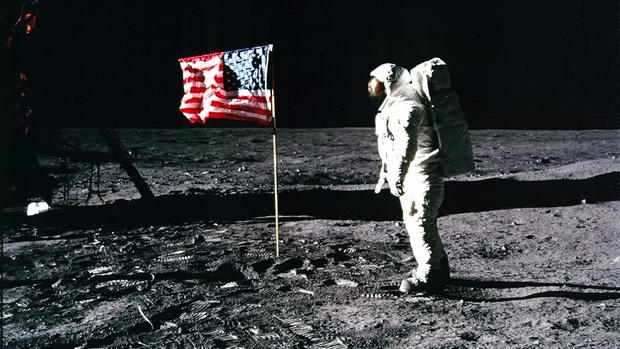Astronaut Buzz Aldrin on legacy he wants to leave behind
It's been nearly 50 years since Buzz Aldrin stepped foot on the moon. But the American hero still has his sights set on space.
At 86 years old, Buzz Aldrin still keeps an impressive schedule. He just wrapped up a non-stop 10-week book tour in the U.S. and the U.K. In his most personable book to date, "No Dream Is Too High: Life Lessons From a Man Who Walked on the Moon," Aldrin shares his wit and wisdom and how his incredible journey all started in the Air Force, reports CBS News correspondent Meg Oliver.
"I took an oath when I was age 17 to serve my country. I have lived by that driving force ever since," Aldrin said.
One night in Washington, D.C., close to a thousand people lined up for a quick handshake, a signature and his legendary stories.
"Do you think that people are going to be able to live on the moon?" one young girl asked.
"Of course! Yeah! Inside," Aldrin answered.
In his new book, Aldrin shares his rules to live by.
"Learn from other people's experiences. That is what that book is all about," Aldrin said.
His experiences inspired a nation. As he reveals in his book, NASA rejected him when he first applied. But he said he knew the sky wasn't the limit. So he tried again, and the rest was history.
It was 47 years ago next week Aldrin followed Neil Armstrong onto the moon. Stepping down second on that historic day has sometimes been a touchy topic.
"What was it like to be the second man who walked on the moon? Was that hard?" Oliver asked.
"Not at all," Aldrin said.
In the book, Aldrin writes: "I should have been the first person to walk on the moon... in all previous missions, if a crew member was to spacewalk, it was always the junior officer. But NASA changed its procedure just prior to our launch."
Commander Neil Armstrong would be first. Aldrin was defensive about it for decades, but Aldrin wants to be remembered for more than just that.
"Well is that what I'm famous for? Or is-- does it have anything to do that I contributed the techniques of rendezvous and that now I was the first to train underwater for neutral buoyancy and I am the one of all the early astronauts who is working on a plan for the future? The rest of them have all faded," Aldrin said.
But Aldrin has come to peace with it. He said it's another life lesson - you can't change history.
"Ten years from now, I will still be introduced as 'the second man on the moon' because you're not going to change history and I'm not going to change it," Aldrin said.
Aldrin had plenty of firsts. During the 1966 Gemini 12 mission, he took the first selfie in space. He tweeted it out on National Selfie Day.
"There was a camera here that was doing things, and I took a picture, and nobody paid any attention to that picture at all until we started coming out with cellphones," Aldrin said.
"You were ahead of your time," Oliver joked.
"No, it's just, the times caught up, OK?"
But the highs came with dark days too. When Aldrin returned from his triumphant moon landing, his mother, Marion Moon, had killed herself.
"I drank. It's what a lot of people do. You find somebody with PTSD, chances are they're going to soothe their discomfort with addictive substances," Aldrin said. "And some people can deal with that and some people are not so good in dealing with that. Depends on their persistence."
But he overcame his depression by seeking professional assistance and help from others.
"Not easy. But it is so worth it to be alive because the pathways are... leading to a pleasant life," Aldrin said.
Today, Aldrin is still a man on a space mission.
"The book is back then, but my life is right now. And right now, it's about the future," Aldrin said.
In the final chapter, Aldrin writes what could be the most important chapter of his storied career. He thinks it's imperative we colonize on Mars.
"So does Stephen Hawking. He says we should, as human beings, find another place to have human beings so that if our world is destroyed for some reason, that there is a saving of the investments of all the human beings that have lived here before us," Aldrin said.
He's proud of kicking up dust on the moon. But Aldrin sees his past a fitting bridge to the future - using the moon as a refueling base for manned missions to Mars.
"What do you want your legacy to be?" Oliver asked.
"To be appreciated for what I may have inspired other people to then carry on," Aldrin said.
